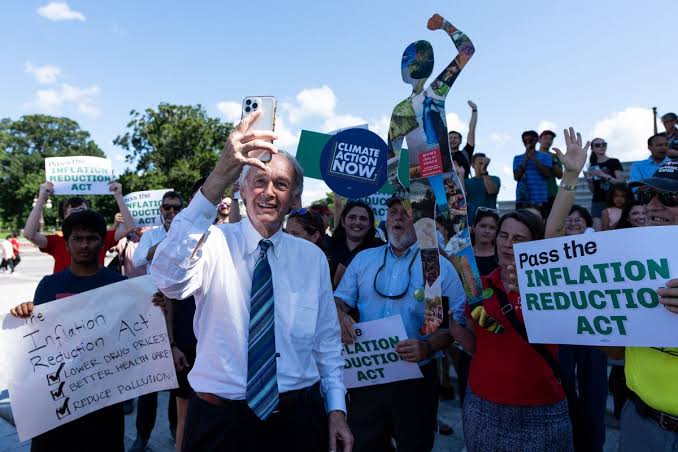
After an hour-long vote-a-rama, the Senate on Sunday passed the Inflation Reduction Act, a package intended to provide crucial money for clean energy investments and steps to lower prescription drug costs.
Sen. Raphael Warnock (D-GA) tried to pass a provision that would have limited the price of insulin products to $35 per month for people with private insurance, but it was defeated. The marathon session that began on Saturday continued into the afternoon on Sunday.
The Inflation Reduction Act might decrease economic growth
Tighter monetary policy, along with pro-growth tax and regulatory changes, is the ideal policy combination to remedy our current economic doldrums. While the Federal Reserve’s monetary policy is on the correct track, the newly named Inflation Reduction Act is utterly misguided.
The tax requirements will reduce investment and slow economic growth by, for example, setting a minimum corporation tax rate. Its regulatory requirements, such as the implementation of drug price limits, will undermine the motivation for innovation and, ironically, lead to an increase in drug prices. Overall, this proposal is a formula for chronic economic stagnation and escalating inflation.
Drug pricing provisions are being heavily criticized
The opposition to the Inflation Reduction Act’s prescription medicine pricing provisions is tenacious and exaggerated. People who oppose the policies frequently claim that they will “stifle innovation” and “devastate” the pharmaceutical business. Unprecedented challenges will undoubtedly be presented to the sector by the implementation of rebates on list prices of pharmaceuticals that exceed an inflation index, the restructuring of Medicare Part D (outpatient), and the requirement of Medicare negotiations for specific drugs.
Furthermore, opponents who wonder why the drug industry is being focused rather than other healthcare sectors that have a greater impact on overall spendings, like hospital inpatient care, have a point. 15 percent or so of healthcare spending is on medications. They are, nevertheless, disproportionately targeted by legislation and regulatory actions.
Party-line voting on the Inflation Reduction Act
Following days of Democratic talks and hours of “vote-a-rama,” a Senate procedure involving an infinite number of amendment votes, the huge package was approved on a 50-50 party-line vote. The tie-breaking ballot was cast by vice president Kamala Harris.
The initial draught bill was modified in the days before the vote so that Sen. Kyrsten Sinema (D-Ariz.) could agree to support the proposal. According to reports, the agreement with Sen. Sinema would somehow exempt manufacturers from the bill’s proposed minimum corporation tax of 15%, and clauses that would have reduced the size of the so-called “carried interest loophole” have been dropped. A 1% excise tax on corporate stock buybacks is reportedly included in the updated version of the bill.
The Inflation Reduction Act now needs to pass the House of Representatives, where the vote margin is also fairly narrow, after being approved by the Senate. On Friday, the House is anticipated to discuss the bill.
Addressing the climate crisis
The Inflation Reduction Act is important for tackling the climate crisis. On Sunday, Senate Democrats gave President Joe Biden a significant victory in the fight against climate change by adopting a package that will direct hundreds of billions of dollars to sustainable energy sources and quicken the United States‘ shift away from fossil fuels. According to a new UN assessment, the past few months have provided a glimpse into the more severe effects of climate change that we can anticipate unless we keep global warming to 1.5° C (2.7° F).
Setting ambitious climate goals and reducing their own emissions are two ways that leading corporations are contributing to the fight against climate change. In fact, the Science Based Targets initiative has given its approval to the climate goals set by more than 50 U.S. Fortune 500 companies.